CareersGuides
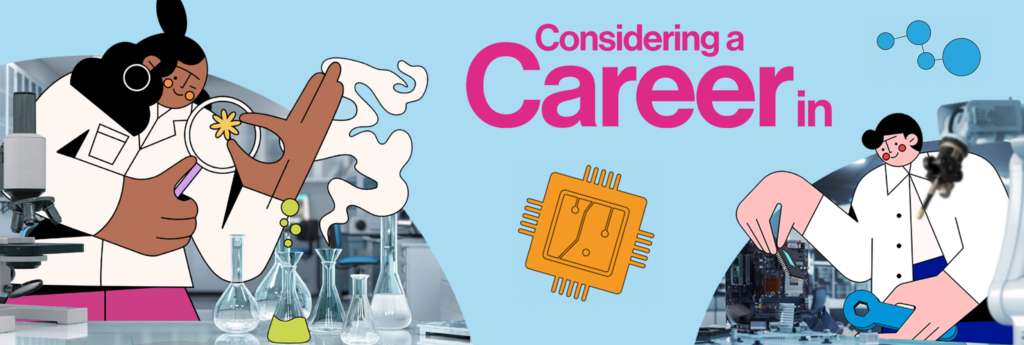
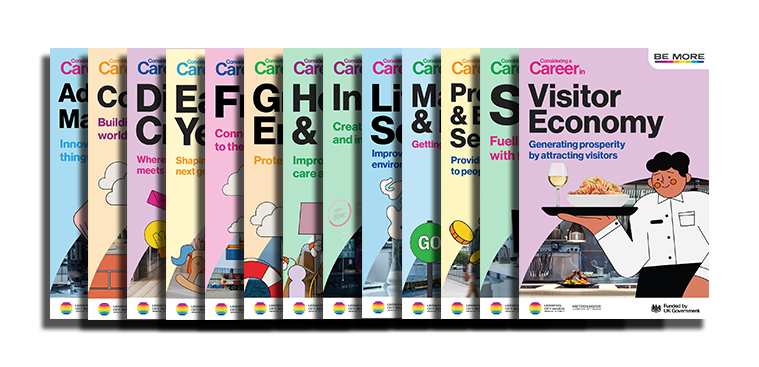
13 brand-new career guides designed to help people in the Liverpool City Region make the best possible career decisions.
The brochures offer a wealth of background information about various industry sectors in our region, as well as guidance on how to launch and develop your career in each one. They are an excellent resource for:
- Individuals who support others in finding the perfect career path, such as parents, teachers, and career advisors.
- School pupils and school leavers thinking about their future careers.
- Job seekers looking for opportunities to work in the region.
- Professionals wanting to change career.
Advanced Manufacturing
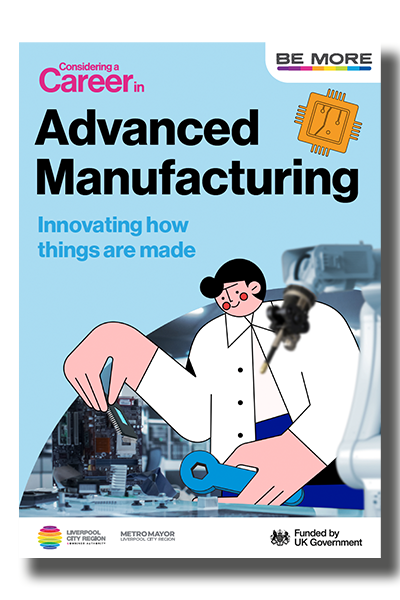
Advanced manufacturing strives to continually improve how things are made, making production processes quicker, smarter and greener.
It combines the human qualities of creativity and logic with progressive technology, such as robotics, artificial intelligence, and augmented reality, to transform how we make and improve products.
From producing zero-emission vehicles and lifesaving vaccines to crafting components for satellites and renewable energy systems, advanced manufacturing revolutionises the world we live in.
There are many production-based industries, and advanced manufacturing drives all of them. This career could see you working in automation, aerospace, clean energy, consumer goods, food and drink, pharmaceuticals, defence or any other industry where things are made.
Whether you’re designing next-generation electric vehicles as an automotive engineer, working with robotics and AI to optimise production, or creating custom medical implants using 3D printing, a career in advanced manufacturing is a career in improving the world.
Professional & Business Services

The Professional and Business Services sector drives innovation and efficiency across every industry, helping organisations operate smarter, faster, and more sustainably.
The sector enhances how businesses perform by combining creative thinking and entrepreneurial spirit with specialist knowledge and skills.
From shaping the future of marketing and business innovation to helping individuals through consulting and legal solutions, professional and business services are at the heart of economic growth.
Countless industries are founded on business & professional services, from law firms to financial advisors and banks. This career could see you hiring new recruits for different careers, helping corporations grow, implementing digital technologies in the workplace, or even starting your own business.
Whether you’re guiding businesses through challenges as a consultant, devising policies for government departments, or helping people with legal issues, a career in professional and business services is a career in helping people and companies to grow.
Construction

The construction industry, sometimes called the built environment sector, is responsible for designing, building and maintaining the human-made structures around us, from buildings to bridges and railways.
Construction covers everything from start to finish in a building project, including planning and sourcing sustainable materials, ensuring safety and monitoring efficiency, and the different manual labour tasks that happen on construction sites.
From building someone’s dream home or restoring a historic museum to producing the green factories of tomorrow, the construction sector is continually developing, restoring or maintaining our built environment.
The sector covers all built structures, so this career could lead to a wide range of opportunities in residential, commercial, industrial, or infrastructure industries, where you could undertake projects for individuals, businesses, or the public sector.
Whether you’re innovating new green building designs as an architectural technologist, managing paperwork for exciting new building projects as a contracts manager, or using practical skills as a labourer, a career in construction means shaping and improving the world around you.
Digital & Creative

The Digital and Creative industry is exciting and future-focused, combining technical skills with artistic innovation. As the digital experience expands into all corners of life, opportunities to create and innovate grow. Education, manufacturing, arts and culture, business and finance, health and life sciences, and cybersecurity are just a few career areas driven by digital and creative skills.
The Liverpool City Region is a thriving hub where creative studios and tech companies develop everything from stunning digital designs to advanced software. We have the Baltic Triangle, known for its vibrant creative business community, Sci-Tech Daresbury, an internationally recognised technology centre, and many other digital and creative hotspots. Our region also has a rich history in music, theatre, and the arts, which provides the perfect foundation for creativity and technology to build on.
Careers in the Liverpool City Region’s digital and creative industries could include game design, marketing, immersive technology, filmmaking, and app development. You might design eye-catching advertising campaigns, build digital communications platforms or create immersive virtual experiences.
Whether you’re leading the way by working on AI-driven design projects, editing audio for TV, or finding evidence for police cases as a digital forensics scientist, one thing’s for sure: a career in the digital and creative sector will see you harnessing the power of technology.
Early Years
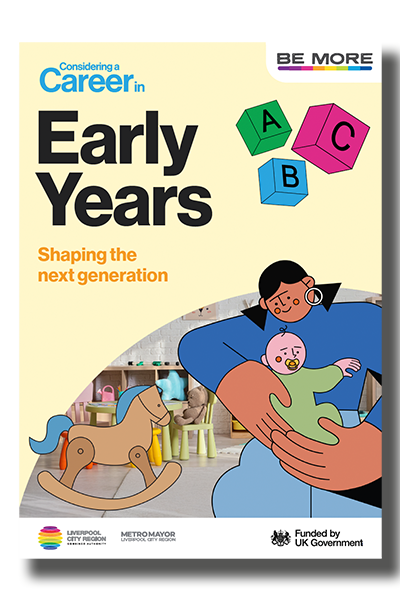
The Early Years sector educates and cares for children from birth to five years old, supporting their emotional, educational, and social development.
People in this sector are positive role models with an enthusiasm for helping children reach their potential in the foundation stage, preparing them for later educational settings such as primary school.
Whether you’re managing a busy local nursery or making a positive difference to a child with special educational needs and disabilities, the sector strives to prepare the next generation for wellbeing and success.
There is a high demand for skilled workers in the sector and opportunities to work in many different roles and settings. A career in this sector means you could work in nurseries, hospitals, playgroups, daycare centres, preschools, and crèches, or you might make home visits.
From organising creative arts and crafts sessions or fun playtime activities to using specialist techniques to assist children with special educational needs, working in early years education means having a big impact on someone’s childhood and future.
Freeport
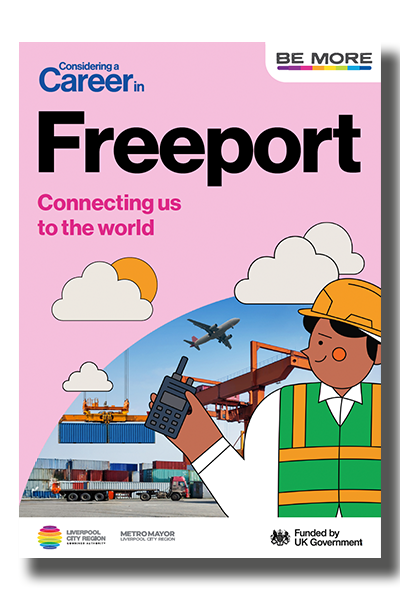
The Liverpool City Region Freeport is a zone with special conditions, meaning that businesses located there can trade goods with the rest of the world more cheaply and faster than other locations. This helps them grow, create jobs, and boost the local economy.
As an industry, the Freeport sector covers products coming into the country (known as imports) and products going out (known as exports). It enables the UK to be plugged into a global trade network. The sector includes many industrial activities, such as storing, processing, and transporting goods. It also covers research, development, and advanced manufacturing to encourage innovation and the use of green technology.
From managing payments for goods transported overseas when you order something online to crafting parts for 50,000-tonne cargo vessels, the freeport sector is essential to keeping the world connected.
The Liverpool City Region Freeport is fast-growing, with space to service many businesses. A career here means you might work in logistics, clean energy, pharmaceuticals, consumer goods, industrial, engineering, or manufacturing industries.
Whether you’re overseeing a project to manufacture, ship, transport and deliver goods as an international freight forwarding specialist or carrying out vital work to check goods and monitor security as a border force officer, a career in the freeport sector means working in a highly-skilled, rapidly growing sector.
Green Energy

The green sector offers careers focusing on reversing climate change, protecting the natural environment, and reducing emissions of harmful greenhouse gases such as carbon dioxide.
The Liverpool City Region is one of many areas worldwide that has committed to a carbon net zero target. All industries, not just those specifically focused on carbon reduction, must play a role in achieving this.
From advising big businesses on reducing their carbon footprint to re-fitting houses with energy-efficient insulation to prevent wasteful heat loss, the green sector aims to reach carbon neutrality in the Liverpool City Region by 2040.
With the global climate crisis becoming more urgent every year, most industries will need the help of green experts to reduce their impact on the planet and make their practices more sustainable. This means you could work in manufacturing, automation, energy, waste management, transport, or any other industry that produces significant harmful carbon emissions.
Whether you’re devising new sustainable energy technologies using renewable materials as a power engineer or working on a local level to inspire and educate your community on reducing waste as a recycling engagement officer, a career in the green sector means protecting the planet’s future.
Health & Social
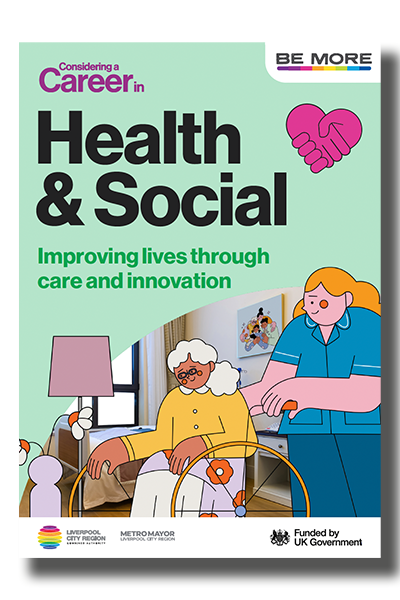
The health and social care sector supports the physical, mental, and social well-being of local communities through face-to-face interaction with patients or ground-breaking health research.
The sector thrives in the Liverpool City Region, where health and life sciences innovation paves the way for better health and social care. Meanwhile, care workers, medical professionals, administrative staff and other support teams collaborate to meet the medical and social welfare needs of individuals and groups in the community.
Health and social care could lead you to work in many unexpected professional settings and roles, from making home visits as an adult care worker or taking X-rays as a hospital radiographer to helping run a youth club or booking patient appointments as a GP receptionist.
Proactive health & social care professional communities can be found in our region’s universities and many NHS hospitals, offering skills development and learning opportunities at every stage of your career.
Whether you’re making prosthetic limbs to enable a patient to walk again, counselling a struggling teenager, working as a nurse or paramedic, or taking photographs to help diagnose patients as a clinical photographer, working in health & social care means saving and improving lives daily.
Innovation

Innovation uses knowledge and skills to develop new and better products and improve processes across many industries. By providing novel solutions, innovation done properly reduces costs without compromising quality or results, streamlining life and work for the better.
Creativity and analytical skills are at the heart of innovation, as well as good business sense and an understanding of how economic value is created. By combining original ideas with technical skills and knowledge of effective techniques, innovators drive progress in many sectors.
From seamlessly adapting artificial intelligence (AI) into engaging teaching materials to developing new clean energy solutions, the sector helps us embrace the future.
As an innovator, you’ll use your ability to think outside the box to solve problems, whether introducing new strategies to a local business or developing life-saving healthcare technology.
With such a broad definition, a career in innovation could see you working one or more of many sectors, including business and commercial, manufacturing, education, healthcare, research science, green energy, or farming.
Life Sciences
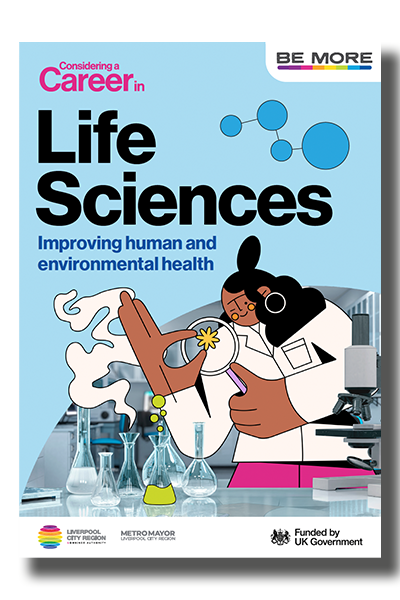
The life sciences sector continually advances our understanding of living organisms, improving healthcare and the natural environment for humans and animals.
It combines innovation and research with cutting-edge technology, such as gene editing, artificial intelligence, and bioinformatics, to improve how we prevent, diagnose, and treat diseases.
From developing new life-saving medications and vaccines to engineering sustainable food products and tackling global ecosystem damage, the life sciences industry drives positive changes for health and the environment.
There are many fields within life sciences, with research underpinning them all. This career could see you working in pharmaceuticals, zoology, biotechnology, genetics, environmental science, clinical manufacturing, and more.
Whether you’re developing breakthrough cancer treatments as a biomedical scientist, using AI to analyse genetic data, or engineering lab-grown organs for transplantation, a career in life sciences is a career in shaping the future health of humans, animals, and the planet.
Maritime & Logistics
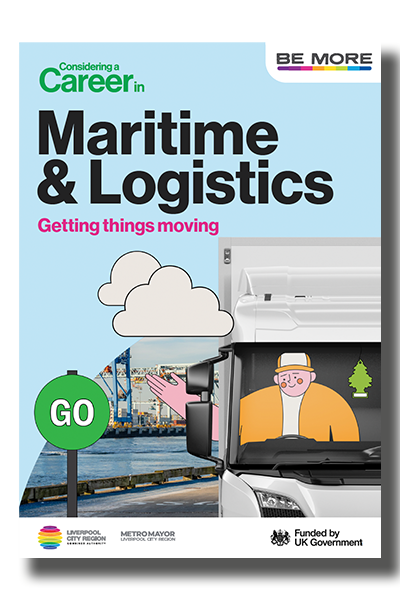
Maritime and logistics drive global trade, allowing goods and resources to move efficiently, sustainably, and securely from one place to another.
The industry relies on human adaptability and problem-solving, alongside different technologies, some new and some traditional, including automation, digital supply chains, and artificial intelligence.
From exporting life-saving vaccines direct from manufacturers, to importing commercial products we use every day at home, maritime and logistics supplies the world with goods. Through docks, airports, motorways, and rail networks, the sector keeps life running smoothly and helps grow the economy.
There are many sectors within maritime and logistics, so this career path could see you working in freight forwarding, shipping management, railway operations, defence, or sustainable transport solutions.
Whether you’re developing new infrastructure to maximise trade, using new digital technologies to streamline global supply chains, or ensuring the safe and efficient movement of cargo and people across the seas, a career in maritime and logistics is a career in keeping the world connected.
STEM

STEM is an abbreviation for science, technology, engineering, and mathematics. These skills are vital for driving economic growth and innovation, making STEM professionals highly sought after.
STEM encompasses a wide range of skills, from creativity to logic and problem-solving. Combining these skills with progressive technology and research has the power to transform and modernise the world around us.
From producing zero-emission cars that use renewable energy to saving lives using revolutionary medications and treatments, STEM drives progress and improvement.
STEM is at the heart of many industries, so your career may lead you into healthcare, digital technology, engineering, ecology, renewable energy, manufacturing, or any other field where these core subjects are essential.
Whether you want to design and launch satellites that investigate our solar system, engineer life-changing prosthetic limbs, or work in a biochemical research laboratory, studying STEM subjects allows you to become a future innovator.
Visitor Economy
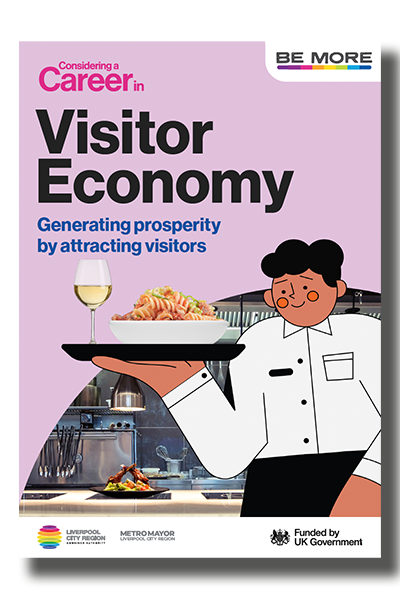
The visitor economy draws people to our region by offering unforgettable experiences within the tourism, hospitality, and leisure industries.
As a career sector, it blends customer service and social skills with the practical skills needed to build, restore, or maintain attractions and venues, such as zoos, museums, hotels, restaurants, and more.
The Liverpool City Region attracts millions of visitors every year, from holidaymakers visiting the coastline to business clients coming from all over the world to attend conferences and events.
The visitor economy is continually growing due to the Liverpool City Region’s interesting culture and fascinating history, as well as its importance to many modern sectors, including innovation, life sciences, and manufacturing.
Whether you’re researching historic architectural methods to restore an iconic building, designing an immersive cultural tour using virtual reality technology, or managing a business conference and events centre, working in the visitor economy sector means creating a positive lasting impression of our region.